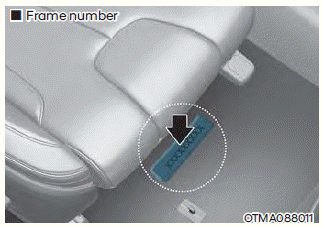Hyundai Santa Fe: Automatic Transaxle Control System / Input Speed Sensor. Repair procedures
| •
|
Refer to the DTC manual for the check procedure.
|
|
| •
|
Be careful not to damage the parts located under the vehicle
(floor under cover, fuel filter, fuel tank and canister) when
raising the vehicle using the lift.
(Refer to General Information - "Lift and Support Points")
|
| •
|
When the solenoid valve Diagnostic Trouble Codes (DTC) is on,
perform the following procedure to replace it.
|
| •
|
Automatic transaxle is composed of delicate components. Be careful
not to cause any damage on the component in the course of assembly
and disassembly.
|
| •
|
Maintain clean condition so that foreign substance does not
get into the automatic transaxle.
|
| •
|
Use a coated apron, latex gloves, and stainless tray to prevent
foreign substance from getting into the transaxle.
|
| •
|
Automatic transaxle fluid (ATF) can be reused. Collect it using
a clean 10-liter beaker.
|
|
|
1. |
Turn ignition switch OFF and disconnect the negative (-) battery cable.
|
|
2. |
Remove the air duct and the air cleaner assembly.
(Refer to Engine Mechanical System - "Air Cleaner")
|
|
3. |
Separate the air bleed hose (B) and then wiring bracket (A).

|
|
4. |
Remove the under cover.
(Refer to Engine Mechanical System - "Engine Room Under Cover")
|
|
5. |
Remove the drain plug (A) and reinstall the drain plug after draining
ATF totally.
|
Drain plug tightening torque :
33.3 - 43.1 N.m (3.4 - 4.4 kgf.m, 24.6 - 31.8 lb-ft)
|

|
• |
Replace the gasket before reinstalling the drain plug.
|
|
|
|
6. |
Loosen the mounting bolts (A) of the valve body cover.
|
Tightening torque :
11.8 - 13.7 N.m (1.2 - 1.4 kgf.m, 8.7 - 10.1 lb-ft)
|

|
• |
Be careful when removing the valve body cover because
the remaining ATF remains in the valve body cover.
|
|
|
• |
Replace the gasket (A) before reinstalling the valve
body cover.
|
|
• |
After the installation, start the engine and then check
if there are any leakages from the valve body cover.

|
|
|
|
7. |
Loosen the bolts and then removing the main harness (A).
|
Tightening torque :
9.8 - 11.8 N.m (1.0 - 1.2 kgf·m, 7.2 - 8.7 lb-ft)
|

|
• |
Check for the looseness, poor connection, bending, corrosion,
contamination, deterioration, or damage before reinstalling
the solenoid valve connector.
|
|
|
|
8. |
Loosen the mounting bolts and then removing the valve body assembly
(A).
|
Tightening torque :
9.8 - 11.8 N.m (1.0 - 1.2 kgf.m, 7.2 - 8.7 lb-ft)
|

|
|
9. |
Disconnect the input & output speed sensor connector (A).

|
|
10. |
Loosen the bolts and then removing the input / output speed sensor (A).
|
Tightening torque :
9.8 - 11.8 N.m (1.0 - 1.2 kgf·m, 7.2 - 8.7 lb-ft)
|

|
|
1. |
To install, reverse the removal procedure.
|
|
2. |
Check fluid level after filling the automatic transaxle with fluid.
(Refer to Automatic Transaxle Syatem-"Automatic Transaxle Fluid(ATF)")
|
• |
After ATF level check or exchange, be sure to remove
residual ATF on transaxle case.
(Be especially sure to remove residual ATF between automatic
transaxle case and valve body cover)
|
|
• |
After installing, check for leakage of coolant or fluid
from hose connection during engine start.
|
|
|
Specifications
▷ Type : Hall effect sensor
▷ Specifications
Items
Specifications
Operation condition [°C(°F)]
(-40 to 150) -40 to 302
Sensor length (mm)
35...
Description
The output speed sensor is a vital unit that measures the rate of rotation of
the transaxle's turbine shaft and output shaft, and delivers the readings to
the TCM...
Other information:
To fasten your seat belt:
Pull it out of the retractor and insert the metal tab (1) into the buckle (2).
There will be an audible “click” when the tab locks into the buckle.
You should place the lap belt (1) portion across your hips and the shoulder belt
(2) portion across your chest...
Removal
1.
Turn ignition switch OFF and disconnect the negative (-) battery cable.
2.
Remove the crash pad lower panel.
(Refer to Body - "Crash Pad Lower Panel")
3...
Categories
Vehicle Identification Number (VIN)

The vehicle identification number (VIN) is the number used in registering your
vehicle and in all legal matters pertaining to its ownership, etc.
The number is punched on the floor under the passenger seat. To check the number,
open the cover.
read more
 Input Speed Sensor. Specifications
Input Speed Sensor. Specifications Output Speed Sensor. Description and operation
Output Speed Sensor. Description and operation










